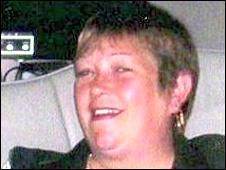Police domestic abuse response better, say campaigners
- Published

Police are now better trained to deal with victims, say support groups
The police response to domestic abuse is improving, but more can be done, say campaigners.
North Wales Police were criticised in a report this week over the murder of Karen McGraw, 50, by her former partner at her Flintshire home.
An investigation said police could not have prevented her death but should have done more to protect her.
Support groups say police treat abuse complaints more sensitively, but say victims are still sometimes let down.
Police apologised for not providing enough support for Ms McGraw, who was murdered by Trevor Ferguson in Connah's Quay last year.
Paula Hardy, chief executive of Welsh Women's Aid, said: "There is a very high level of commitment to improving police responses.
"If you talk to women particularly who have needed to call police, there's still a pretty mixed bag of responses but, on the whole, the general consensus is that things have improved and police treat complaints with more sensitivity."
She said there was a lot more understanding of domestic abuse and commitment to training officers.
"Police forces' understanding of the complexities have increased. There's more understanding about how difficult it is for a woman to leave an abusive relationship - to find the courage to leave is sometimes underestimated," she said.
She said it was very important to have a standard response across Wales from bodies working closely together - such as police and local authorities - that may be involved in helping a victim of domestic violence.
Services are available to help both men and women who are the victims of domestic abuse. Special domestic violence courts also now sit in Wales with staff trained to deal with abuse cases.
Liz Armitti, domestic violence service manager for Safer Wales, said: "I think there's always room for improvement - we constantly face the situations that provide evidence for that.
"In Cardiff, we have very good working relationships with police and all the criminal justice agencies. We're very proactive in working together."
She said multi-agency risk assessment conferences took place in the city every fortnight looking at how best to protect the domestic violence cases where people were most at risk.
Many victims of abuse do not even contact police.

Karen McGraw was stabbed three times at her home
The Wales Domestic Abuse Helpline has received more than 83,000 calls since it was set up in April 2004.
But on average, a quarter of callers who were personally experiencing abuse - excluding "silent" calls and people who hang up, for example - had not reported the abuse to officers.
'Serious injury'
Ms Hardy said there were other ways that victims could get help.
"A lot of the criminal side is focused at the high end where victims are in fear of serious injury or death, but there are other options involving Women's Aid services across Wales that provide emergency refuge accommodation," she said.
There are also services, usually provided by police or local authorities, where victims can have their locks changed, windows made more secure or a panic alarm fitted.
On a strategic level, the Welsh Assembly Government said it was committed to tackling all forms of violence against women, including domestic abuse. It has just announced a new domestic abuse policy for its own staff which it hopes will be an exemplar to other organisations.
A spokesperson said: "Earlier this month we launched the One Step Too Far campaign which aims to stamp out unacceptable attitudes and behaviour towards women before it leads to more violent forms of abuse.
"The advertising campaign is part of Welsh Assembly Government's 'right to be safe' strategy which provides a comprehensive response to enduring social problems of violence against women, including domestic abuse, sexual harassment, rape, forced marriage, trafficking, honour crimes and female genital mutilation."
The assembly government said that since 2005, it had taken many steps to help tackle abuse including funding various projects, establishing a 24/7 helpline, creating sexual assault referral centres and funding a safe house for women fleeing prostitution plus a new refuge for victims with complex needs.
- Published15 June 2010
- Published1 June 2010